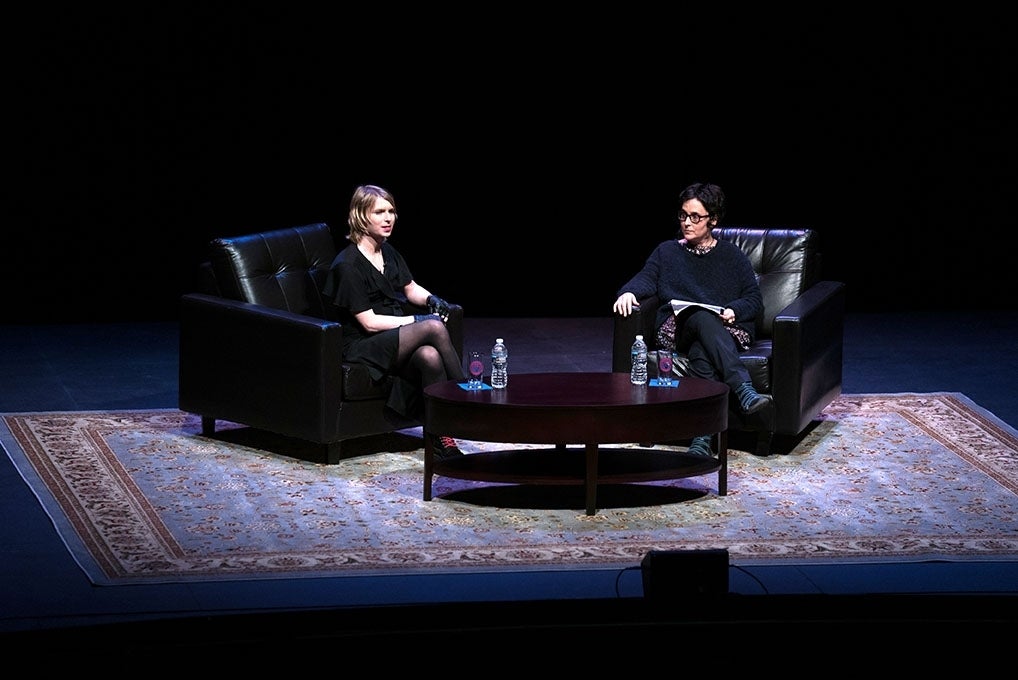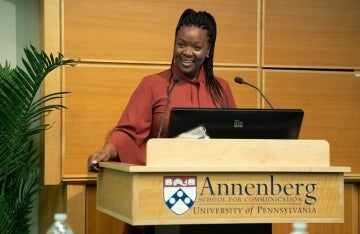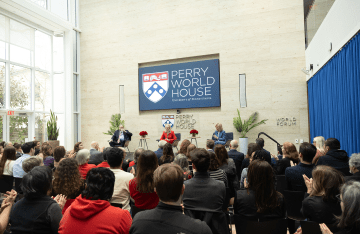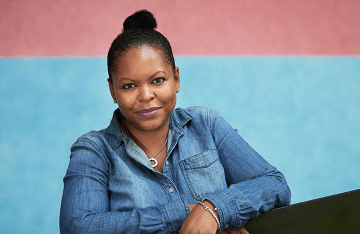Chelsea Manning Speaks at Penn on Technology, Government, and Activism
A former intelligence analyst, Manning is an advocate for government transparency and transgender rights.

Chelsea Manning
On November 29, the Annenberg School — in conjunction with seven other University of Pennsylvania departments and groups — hosted technology expert and activist Chelsea Manning for a conversation about the intersections between technology, government, and people’s lives. The event was moderated by Gabriella Coleman, Wolfe Chair in Scientific and Technological Literacy at McGill University.
As an intelligence analyst for the U.S. Department of Defense, Manning sparked international controversy when in 2010 she passed to WikiLeaks 750,000 classified or sensitive military and diplomatic documents revealing human rights abuses and corruption connected to the U.S. wars in Iraq and Afghanistan. Some saw the move as a courageous act of whistleblowing, while others considered it a betrayal of her country. Sentenced to 35 years in a military prison, Manning was released in 2017 after President Obama commuted her sentence to the seven years she had been incarcerated.
While in prison, Manning publicly identified as a trans woman and asserted her right to medical therapy. She is now an advocate for government transparency and queer and transgender rights.
For the event at Penn, which was held at the Zellerbach Theater of the Annenberg Center for the Performing Arts, Manning was interviewed by Gabriella Coleman, a researcher of hacker culture and online activism who is considered one of the leading experts on the hacker group Anonymous. Coleman, who has known Manning for more than a year, first began speaking with Manning by phone during her incarceration.
In her opening comments to the crowd, Coleman explained how she got to know Manning as a multi-dimensional, witty person — something that did not necessarily come across in the media coverage of her case — and hoped the audience might experience that during the talk.

During the conversation, Manning discussed her decision to release classified documents, and was emphatic that she had no regrets about her actions. Manning described how she was troubled by the unintended consequences created by the military’s algorithms designed to observe Iraqi behavior and suggested American responses to it. Instead of preventing bad behaviors, the technology was manipulating both sides in a feedback loop. Her superiors, Manning said, refused to think about how the algorithms, intended to solve problems, were instead becoming the problem by instigating both sides’ behavior.
Manning described how in prison, she spent hours in the library building her legal knowledge to be able to understand and fight her case. She also learned to write op-eds, and described the slow process of corresponding with her editor at The Guardian by mail.
She spoke also of a similarly tedious system by which she ran her Twitter account in prison, having messages read to her over the phone and dictating messages and responses to others on the outside who could post for her. Now out of prison, Manning has been enjoying her freedom to build her Twitter persona (@xychelsea), often, as Coleman noted, skillfully disarming the negativity of her trolls with that banter.
Manning also described the community she was surprised to find in prison, as inmates often took care of one another. She spoke of finding corruption in the way that the written requests for basic supplies like toilet paper and toothpaste were mysteriously lost by prison staff, forcing inmates to share and help each other.
In a similar vein, Manning emphasized her belief in the importance of solidarity between and among various activist communities. As someone who belongs to both the hacker community and the trans community, Manning expressed frustration at how many diverse networks are all fighting against the same forms of power, lack of governmental transparency, and military overreach. She encouraged different communities to listen to one another and work together to see their agendas achieved.

In the Q&A period, Manning took many questions from audience members, and not all were positive in tone. One questioner, who identified as a veteran himself, asked how she felt about the possibility that her leaked material may have harmed other military personnel. Other questions were supportive, asking about her time in prison, her feelings about gender pronouns, and seeking her advice in organizing for activism.
Manning also weighed in on the current net neutrality debate, suggesting that the F.C.C. may not be the best entity to determine the future of the internet, and insisting that regular citizens should be given a greater say in this, and many other, matters.
In addition to the Annenberg School, the event was sponsored by the Alice Paul Center for Research on Gender, Sexuality, & Women; Political Science Department; History of Sociology and Science Department; Government and Politics Association; LGBT Center; Lambda Grads; and Black Graduate and Professional Students Assembly.



